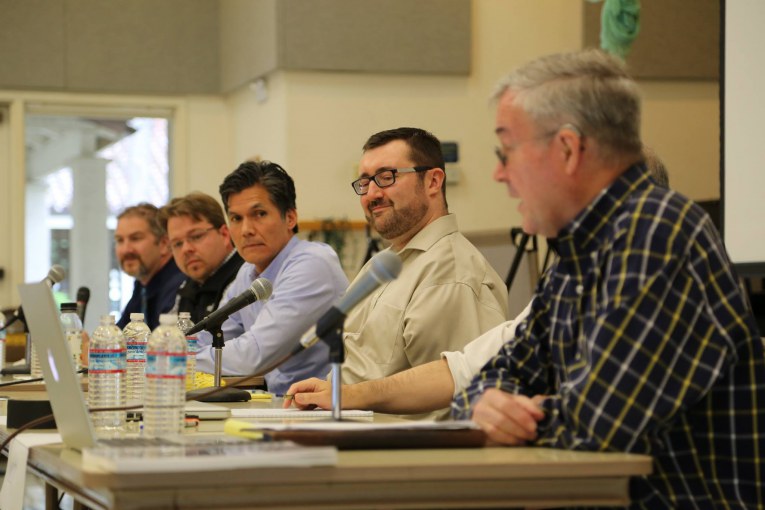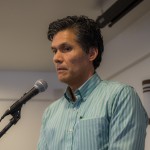

Next week, we will begin our series of eight council candidate questions leading up to the election. For this week, we will highlight some key responses to questions posed at the March 12 candidates’ forum. Since then, Paul Boylan has dropped out of the race, so we will only present the answers from the four remaining candidates.
Question: How do you see us solving the student housing crisis in Davis?
 Lucas Frerichs
Lucas Frerichs
This may even be the biggest issue facing Davis right now. There’s certainly the financial issues facing the city, there’s no question that’s chief among the issues facing the city. But the issue regarding student housing and the appetite for growth that UC Davis has, is issue number one for us.
We certainly need to engage the university in a more proactive way. That has not been happening. There are some other issues recently that have come up in the media and the news that I think are probably taking the chancellor’s time currently.
I think that we do have a pretty good relationship with the university currently and I think we can actually improve upon that quite a bit, but we really need to insist that – and frankly if it means this ultimately through legal means, we need to insist that the city take a more proactive stance with the university particularly.
Make sure that the university puts some of the housing, if they’re going to continue to grow, put some of that housing on campus. We see this issue in the neighborhoods abutting campus – I’m not at all opposed to students, I think they’re one of the reasons why this a good community to live in. It’s because of the quality of life, because it’s a college town.
But I think we have to have a major – not just one conversation, but ongoing and bolster the relationship with the university regarding their approach to growth.
We cannot just have them putting all of that growth on the city of Davis. It’s causing all of these issues including the Sterling Apartment issue and others, vacancy rates close to zero percent. It’s impacting the quality of life in our community, we absolutely need to be engaged with the university.

Brett Lee
I would agree with what Lucas has said – especially with working with the university. They are a sovereign entity but I think we can work with them so that they fulfill more of their commitment to apartments for students.
I think we should also build some additional apartments in the city. We have several proposals before us – most of the problems I have with them are size and scale. They can be scaled down. There haven’t been any large apartment complexes in quite some time.
I think also in terms of our downtown, we get kind of a two-for on this. By having some more mixed use downtown – so residential above retail or commercial. I think that helps support our local shops. I’ll just throw out there Alphabet Moon – I was disappointed that we lost that shop.
If we had more people living downtown, they would tend to support those shops and hopefully independent shops. I don’t want Davis to become sort of a cookie cutter downtown in terms of just sort of national chains.
I think it’s important that we find a way to support the shops downtown. One of the ways is additional residential on second or third floor above the shops.
That will help a bit, and then we also need to have sort of a realistic understanding that the students are moving into single family residential neighborhoods. We need to allow for that and minimize the negative impacts.
The current council’s working on a renters ordinance and also working on a mini-dorm ordinance and the goal here is to minimize the negative aspects of groups of students renting single-family residential.
It’s going to take awhile for the university to catch up with the current shortfall of units. But I think we can do something so that the existing neighborhoods aren’t as directly negatively impacted by what’s going on currently.
 Will Arnold
Will Arnold
I would venture to guess that the most important decision that’s ever been made by the people that affected the city of Davis was when the university regents decided to put the university farm here. For the most part, it was a great thing for our community.
Davis wouldn’t be Davis without UCD. Our schools wouldn’t be what they are without UCD. We wouldn’t have the cultural and educational opportunities that we have of a town our size without UCD. But, like any college town, I don’t think it’s unique to Davis, these relationships get strained.
I think they probably deal with this in Ann Arbor and they probably deal with this in Chapel Hill – they certainly dealt with it in Eugene, Oregon, where I went to school. But when it’s said that UCD isn’t fulfilling its obligations for housing, that’s not just somebody’s opinion – these are agreements that UC Davis made.
They agreed with an MOU with the city that they would house 25 percent of their students on campus. They’re close to that, they’re in the low twenties. But they’re not where they agreed to be. In their Housing for the Twenty-First Century, the whole University of California system, they wanted 38 percent of their housing to be on campus and, of course, they’re not even in that ballpark.
So it’s not just that we’re pulling out a concept or some numbers out of thin air when we say the university isn’t doing its part to house students, it’s their own obligations they’ve made that they’re not fulfilling.
 Matt Williams
Matt Williams
What we don’t know can hurt us. The one place where I might differ slightly is that if we try to negotiate with Alley-oop’s club beating them over the head, the chances are we’re not going to get anywhere.
We somehow need to be able to find and define the win-win playing field. Right now, they don’t see any win at all in building housing on the campus. What we need to do is to somehow reach out to them.
I met on Wednesday with Ramona Hernandez with student housing and suggested that it would be really really good for them to be able to see where is the zip code origin of all 36,000 of their students. And be able to know that x-percent of them are now coming from West Sac and Sacramento and getting on Richards and trying to go through the tunnel and parking in the B Street neighborhood for free and walking onto the campus.
The impacts on the quality of life of Davis – UCD only sees it anecdotally. We need to build an information base. They actually have incredible amounts of information. They know where every student is by zip code. So they’ll be able to see what the evolution is of the 5000 to 6000 additional students they’ve added in the past four years.
They can look at the distribution of where it was four years ago and where it is now and understand what the impact is on the city. Once you understand what you’re doing to your partner – this clearly is as Will said, when they take ownership.
We need to be able to engage the university in a more productive way in order to forge a more positive partnership.

None of the answers hinted at what I would have liked to have seen – someone present an actual solution that the city could provide. Talking to UCD is an easy out, but UCD is not going to solve the housing crisis. So how would you as a councilmember do it? No one answered that question. No one said, we need to have three relatively large apartment complexes. Brett came the closest, but he’s hedging on size and scale at a time when we need more size and more scale or more projects.
Agreed, they all point the finger at UCD when the housing shortage has been caused by the decisions that our community has made as much or more than anything the University has done. We need to stop blaming others for the problems that we have created and find solutions instead.
That is a fair criticism Mark and Pugilist.
I will put together my thoughts on possible solutions and post them here later tonight.
Mark… UC has taken much credit for student housing that they bought in the City (already built, and coming out of private stock, although often student-oriented)… neither UCD nor the City have “clean hands”… both are culpable…
Davis is a generation behind in housing construction of all types and the cautious statements of the candidates not wanting to ruffle the feathers of an electorate that has gone off the rails on housing limits the ability to do what needs to be done on housing. An interesting article today shows where the trend is going and Davis seems to be wedded to trying to provide a fix that nobody wants.
http://www.businessinsider.com/millennials-will-be-just-like-their-parents-2016-3
The big elephant in the room is FINANCING! Where does the money come from? What policies can be put into place to encourage the sort of developments the City and UCD needs to address the long term housing needs given the lack of financial resources both entities have for building homes? How to encourage more public/private partnerships to help address the financial need? How do we encourage market rate developers, who benefit greatly from government decisions (i.e. land use and zoning changes), to contribute more to solving this crisis?
And I’m confused with some of these answers…why would we want our single family neighborhoods to become havens for students who will only be here in the short term? Shouldn’t we be encouraging and providing opportunities for more families to move here who will put their roots down for the long term? Those who will send their kids to our schools, support small biz not corporate biz, beautify our neighborhoods not turn them into mini dorms and turn the streets into parking lots, fill our parks with kids’ laughter and family sports, games of tag and hide-and-go-seek, not keg parties or slosh ball? Why allow more of our single family neighborhoods to be turned into student rental neighborhoods?
ruralknight, I absolutely do not want our single family neighborhoods to become havens for students who will only be here in the short term. I absolutely do want to be encouraging and providing opportunities for more families to move here who will put their roots down for the long term.
Our past conversations here in the Vanguard have engaged both of those goals, as well as finding ways to address the financing issues.